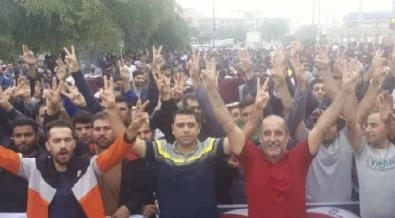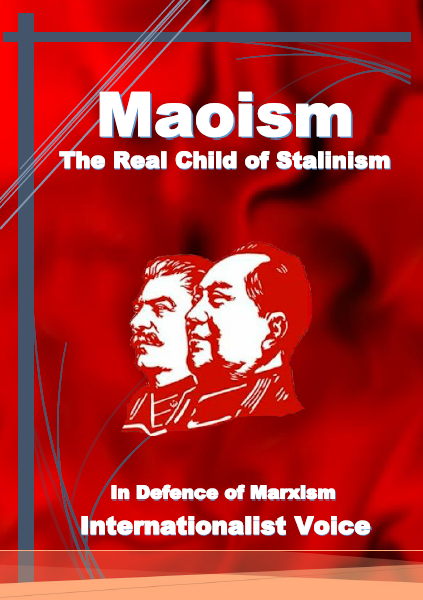UK, France, Spain, Germany, Mexico, China… Everywhere the same question: How to develop the struggle? How to make governments back down?
We republish the article that the comrades of the International Communist Current in the face of the new wave of class struggle published.
General strikes and giant demonstrations on 7 March in France, 8 March in Italy, 11 March in the UK. Everywhere, the anger is growing and spreading.
In the UK, a historic strike wave has been going on for nine months. After having suffered decades of austerity without flinching, the proletariat in Britain no longer accepts the sacrifices. “Enough is enough”. In France, it’s the increase in the retirement age that has lit the powder keg. Demonstrations brought millions of people to the streets. “Not one year more, not one euro less”. In Spain, huge rallies were held against the collapse of the health care system, and strikes broke out in many sectors (cleaning, transport, IT, etc.). “La indignación llega de lejos / Indignation comes from afar,” the newspapers said. In Germany, strangled by inflation, public sector workers and their postal colleagues went on strike for pay rises, something “never before seen in Germany”. In Denmark, strikes and demonstrations broke out against the abolition of a public holiday in order to finance the increase in the military budget. In Portugal, teachers, railway workers and health care workers are also protesting against low wages and the cost of living. The Netherlands, Denmark, the United States, Canada, Mexico, China… the same strikes against the same unbearable and undignified living conditions: “The real hardship: not being able to heat, eat, look after yourself, drive!
The return of the working class
This simultaneity of struggles across all these countries is no accident. It confirms a real change of spirit within our class. After thirty years of resignation and despondency, through our struggles we are saying: “We are not going to take this anymore. We can and we must fight“.
This return of working class combativity allows us to stand together, to show solidarity in the struggle, to feel proud, dignified and united in our fight. A very simple but extremely valuable idea is germinating in our heads: we are all in the same boat!
Employees in white coats, blue coats or ties, the unemployed, precarious students, pensioners, from all sectors, public and private, we are all beginning to recognise ourselves as a social force united by the same conditions of exploitation. We suffer the same exploitation, the same crisis of capitalism, the same attacks on our living and working conditions. We are involved in the same struggle. We are the working class.
“Workers stand together“, shout the strikers in the UK. “Either we fight together, or we’ll end up sleeping in the street“, confirmed the demonstrators in France.
Can we win?
Some past struggles show that it is possible to make a government back down, to slow down its attacks.
In 1968, the proletariat in France united by taking control of its struggles. Following the huge demonstrations of 13 May to protest against the police repression suffered by the students, the walkouts and general assemblies spread like wildfire in the factories and all the workplaces to end up, with its 9 million strikers, in the biggest strike in the history of the international workers’ movement. Faced with this dynamic of extension and unity of the workers’ struggle, the government and the unions rushed to sign an agreement on a general wage increase in order to stop the movement.
In 1980, in Poland, faced with the increase in food prices, the strikers took the struggle even further by gathering in huge general assemblies, by deciding themselves on the demands and actions, and above all by having the constant concern to extend the struggle. Faced with this show of strength, it was not just the Polish bourgeoisie that trembled, but the bourgeoisie of all countries.
In 2006, in France, after only a few weeks of mobilisation, the government withdrew its “Contrat Première Embauche”. Why was this? What frightened the bourgeoisie so much that it backed down so quickly? The precarious students organised massive general assemblies in the universities, open to workers, the unemployed and pensioners, and put forward a unifying slogan: the fight against casualisation and unemployment. These assemblies were the lungs of the movement, where debates were held and decisions were taken. The result: every weekend, the demonstrations brought together more and more sectors. Waged and retired workers joined the students under the slogan: “Young lardons, old croutons, all in the same salad“. The French bourgeoisie and the government, faced with this tendency to unify the movement, had no choice but to withdraw the CPE.
All these movements have in common a dynamic of extension of the struggle thanks to the workers themselves taking control of it!
Today, whether we are waged workers, the unemployed, pensioners, precarious students, we still lack confidence in ourselves, in our collective strength, to dare to take direct control of our struggles. But there is no other way. All the “actions” proposed by the unions lead to defeat. Pickets, strikes, demonstrations, blocking the economy… it doesn’t matter as long as these actions remain under their control. If the unions change the form of their actions according to the circumstances, it’s always to better maintain the same substance: to divide and isolate the sectors from each other so that we don’t debate and decide for ourselves how to conduct the struggle.
For nine months in the UK, what have the unions been doing? They have been scattering the workers’ response: every day, a different sector on strike. Each one in its corner, each one on its separate picket line. No mass meetings, no collective debate, no real unity in the struggle. This is not an error of strategy but a deliberate division.
How in 1984-85 did the Thatcher government manage to break the back of the working class in the UK? Through the dirty work of the unions who isolated the miners from their class brothers and sisters in other sectors. They locked them into a long and sterile strike. For more than a year, the miners shut down the pits under the banner of “blocking the economy“. Alone and powerless, the strikers went to the end of their strength and courage. And their defeat was the defeat of the whole working class! The workers of the UK are only now, thirty years later, raising their heads. This defeat is therefore a costly lesson that the world proletariat must not forget.
Only by gathering in open, massive and autonomous general assemblies, really deciding on the conduct of the movement, can we wage a united and spreading struggle, carried forward by solidarity between all sectors, all generations. Assemblies in which we feel united and confident in our collective strength, in which we can adopt increasingly unifying demands. General assemblies which can form massive delegations to meet our class brothers and sisters, the workers in the nearest factory, hospital, school, administration.
The real victory is the struggle itself
“Can we win?” The answer is yes, sometimes if, and only if, we take our struggles into our own hands. We can stop the attacks momentarily, make a government back down.
But the truth is that the global economic crisis will push whole sections of the proletariat into poverty. To get by in the international arena of the market and competition, every bourgeoisie in every country, whether its government is left, right or centre, traditional or populist, is going to impose increasingly intolerable living and working conditions.
The truth is that with the development of the war economy in the four corners of the planet, the “sacrifices” demanded by the bourgeoisie will be more and more unbearable.
The truth is that the imperialist confrontation between nations, all nations, is a spiral of destruction and bloody chaos that can lead all humanity to its destruction. Every day in Ukraine a torrent of human beings, sometimes 16 or 18 year olds, are being mowed down by abominable instruments of death, whether Russian or western.
The truth is that simple epidemics of flu or bronchiolitis are now bringing exhausted health systems to their knees.
The truth is that capitalism will continue to ravage the planet and wreak havoc with the climate, causing devastating floods, droughts and fires.
The truth is that millions of people will continue to flee war, famine, climate catastrophe, or all three, only to run into the barbed wire walls of other countries, or drown into the sea.
So the question arises: what is the point of fighting against low wages, against the lack of personnel, against this or that “reform”? Because our struggles carry the hope of another world, without class or exploitation, without war or borders.
The real victory is the struggle itself. The simple fact of entering the struggle, of developing our solidarity, is already a victory. By fighting together, by refusing resignation, we prepare the struggles of tomorrow and we create little by little, despite the inevitable defeats, the conditions for a new world.
Our solidarity in struggle is the antithesis of the deadly competition of this system, divided into rival companies and nations.
Our solidarity between generations is the antithesis of the no-future and the destructive spiral of this system.
Our struggle symbolises the refusal to sacrifice ourselves on the altar of militarism and war.
The struggle of the working class is immediately a challenge to the very foundations of capitalism and exploitation.
Every strike carries within it the seeds of revolution.
The future belongs to the class struggle!
International Communist Current
25 February 2023













